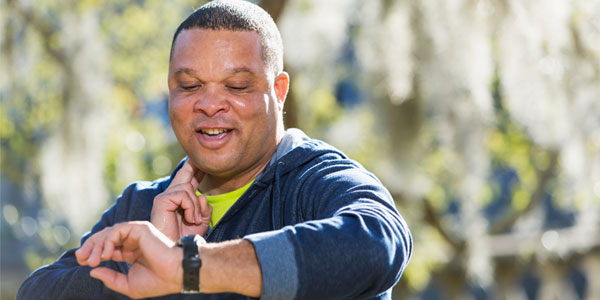Get to Know Your Heart Rate: It Might Save Your Life
Your heart rate is a measure of how many times your heart beats in a minute. For most people, a healthy resting heart rate (RHR) is between 50 and 90 beats per minute, but this number can vary depending on factors such as medication and your fitness level.
“Many people are familiar with how fast their heart beats when they exercise, through the use of common monitoring devices,” says Ronesh Sinha, M.D., an internal medicine doctor with Sutter. “But how much do you know about your resting heart rate? This important number is one of the simplest ways to monitor your heart health. It can even help with stress management.”

The easiest way to measure your RHR is to put two fingers on the side of your neck or your wrist, count how many beats you feel for 15 seconds, and then multiply by four. Or you can download one of the many free smartphone apps that use your phone’s camera to detect your pulse in your fingertip. (If you want to confirm an app’s accuracy, check it against your wrist or neck pulse.)
What can your heart rate tell you?
A Higher Resting Heart Rate Can Be Concerning
Several studies have confirmed that the higher your resting heart rate, the greater your risk of death. Most of this risk is due to heart disease, but other causes of death also contribute to the risk. One study showed that a RHR of more than 90 beats per minute was associated with higher heart disease death rates (doubled in men and tripled in women).
Healthy Hearts Recover Faster
If you are healthy and fit, your heart will recover quickly after exercise, promptly returning to a lower rate. If you're out of shape, however, you’re likely to huff and puff after a workout, while your heart rate stays high for a longer time. You can assess this by measuring your heart rate recovery (HRR) — the difference between your beats per minute when exercising vigorously and your beats per minute one minute after stopping exercising.
To find your HRR, exercise at a high intensity for a few minutes. “High-intensity exercise is when you can’t say more than three or four words without significant effort, and are breathing mostly through your mouth,” Dr. Sinha says. Stop exercising and immediately measure your heart rate, then again one minute later. A decrease of 15-25 beats per minute in the first minute is normal. The higher the number of decrease, the fitter you are.
“The difference between those two numbers can also tell you something about your risk of dying from a heart attack,” Dr. Sinha adds. “Studies show that if it drops by 12 or fewer beats in that one minute after exercise, you have a higher risk of death from heart disease."
Are You Stressed?
Keeping an eye on your heart rate can give you a fairly accurate indication of your body’s stress levels. “I do frequent checks with my phone throughout the day to see where my heart rate is,” Dr. Sinha says. “I’ve noticed that my resting heart rate will be around 55 beats per minute when I first get up in the quiet early morning, but it will jump up into the 80s when I’m trying to get the kids to school on time. It’s a direct reminder for me throughout the day to slow down and breathe.”
Drink Enough Water
When you are dehydrated, your heart reacts by beating faster. So even if you are feeling relaxed, a higher heart rate may mean you need to increase your fluid intake. Sip water throughout the day to keep hydrated.
Consume Less Caffeine
Caffeine is a stimulant that can raise your heart rate, so be sure not to overdo it. Drink the least amount of coffee or tea that you need to keep you going. Opt for black tea or green tea when you can, or herbal if you don’t need an energy boost.
Track Your Heart Rate
Keeping track of your heart rate can give you insight into your fitness level, heart health and emotional health, Dr. Sinha says. “Many people are walking around with a resting heart rate that is too high, due to factors such as too much caffeine, dehydration, inactivity and persistent stress. Those extra heart beats over time can be taking years off your life.”
Dr. Sinha recommends tracking your heart rate as well as keeping a journal of which activities are causing higher heart rates. Then use that information to make changes, set priorities and move toward a healthier life. If daily stress is raising your resting heart rate, for example, think twice about taking on that extra project at work or school. Consider adding a morning walk or a 10-minute breathing session at lunch. (If you plan to start a regular exercise program, look for a heart monitor that comes with a chest strap; it’s easier to use than measuring your pulse manually during exercise.)
A final reminder from Dr. Sinha: Get your doctor’s OK before exercising hard if you have a heart condition or other disorder where exercising may be unsafe. Also keep in mind that certain medications can affect your heart rate, making it a less reliable measurement.
Discover Similar Stories
Choose a topic below to read more stories like this one.
Your #1 Healthcare Advocate
Whether you’re not feeling well or want advice, you can call your primary care provider.





